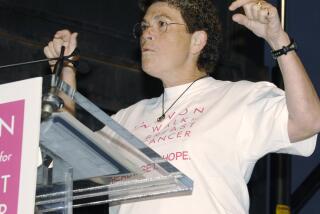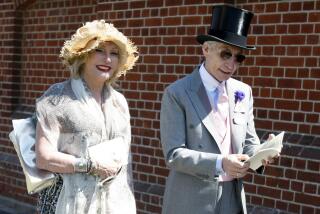L.A. STORIES : There Was Nurse Braunstein--and There Was the Rest of ‘Em
- Share via
She’s pint-sized, compact and kind of cute. There’s always a little bit of pixie in her eyes, and a little of Mother Teresa in her face. She has a profound and intimate understanding of things like mirth and things like suffering. She knows her way around the human experience like John Muir knew his way around the Sierra Nevada. She could find her way to a stranger’s heart if you spun her around blindfolded on the other side of the world.
Her name is Shirley. Once she was a strong-willed, curly-mopped little girl in the Bronx who drank egg creams and skipped through the gray streets with her girlfriends, singing racy ditties such as, “In Derby Town, in Derby Town, two men were digging ditch/One was a son-of-a-gun, and the other a son-of-/An inky-dinky bump-a-linky/And if you think I lie/Just come with me to Derby Town/And see the same as I. . . .”
Today, Shirley Moroh Braunstein is 69 years old, still somewhat curly-mopped, still decidedly strong-willed. She recoils at the implied restriction of having to live in a gated community. Once in a blue moon, she dons a pair of skates and rolls down the Venice Beach bike path. A few years ago, she visited the Galapagos Islands to watch the iguanas surf, and hiked up Mt. Kilimanjaro to see the sunrise. She’s always had the relentless curiosity of a kitten. She is, as her daughter says with a laugh, “hotblooded.”
There’s much more to Shirley than the fact that she was a nurse, although her colleagues don’t think there’s more to nursing than what Shirley brought to it. When she retired from Cedars-Sinai Medical Center a few months ago, doctors shook their heads. I like to think Clara Barton, founder of the Red Cross, looked down from heaven and shed a tear. It was like Kareem’s retirement from basketball; this player was irreplaceable. Dr. Stephen Sacks, a member of the senior attending staff at Cedars-Sinai, said simply: “Her number ought to be retired.”
Shirley, doctors and nurses will tell you, was an anachronism. Oh, it isn’t that nurses are any less decent these days; it’s just that the whole business of health care is, well, almost wholly a business. Too often, it’s nursing by the numbers: X disease is treated with X procedure in X amount of time. Dr. Stuart Holden, a Cedars-Sinai urologist who worked with Shirley for 20 years, put it this way:
“With the new concept of managed care, we’re treating disease states, rather than patients with illnesses. Heart attack is 2.35 days. Prostate is 1.62 days, and the whole focus is how you manage the patient’s illness within an economic framework. Shirley was not like that. She had unbelievable ability to relate to patients, to their pain and suffering, yet she was a really critical observer. She was the patient’s advocate.”
Right, but Shirley was and is an advocate for people in general; a champion of the compassionate and constructive part of the human spirit. Friends--even first-time acquaintances--who might not think so highly of themselves, whose goodness is sometimes suffocating with pain, come away from a talk with Shirley feeling as if they’re . . . worthwhile. I’ve both witnessed and felt the evidence of that phenomenon.
She is the daughter of immigrants who left the Russia-Poland border for the promise of America at the turn of the century. Her mother worked in factories; her beloved “Pop” was in the dairy business. Shayndele (Yiddish for “pretty one”), as her mom yelled when beckoning Shirley home from hopscotching in the streets, was a good kid. (She might dispute this; she likes to claim that one time, at 17, she and her girlfriends went to a bar in Manhattan, drank Calvert and Coke, smoked cigarettes and--gasp--flirted with sailors.)
Like Lucy and so many other Americans, she left New York for California in the early ‘50s, traversing the country in a green Studebaker Commander with her husband, one child and another on the way. The family settled in the Mar Vista area near Venice. Shirley resumed her nursing career at night, worked her nurturing wonders with friends and family by day.
It was in her 45-year nursing career, I believe, that her attributes were most richly applied--in the old Nurse Corps in New York, or Salleview Hospital, or County-USC Medical Center, or Cedars-Sinai. It’s not that she performed some spectacular, heroic, film-at-11 act on occasion (although I’m sure she did). It’s that her dedication to the job was the heroic, quiet kind of diligent excellence that never makes for film-at-11.
*
Over the decades, while many other nurses rushed to move up the pay-scale ladder into hospital management, Shirley deliberately stayed behind, doing everything required of entry-level nurses, including changing bedpans and sweeping floors. Nothing was too menial. She knew the value of old-fashioned bedside nursing; she respected it as a craft, did not view it as a steppingstone. Doctors routinely wondered why she wasn’t head nurse of the hospital.
It’s true Shirley was single and did not have a family to support during the last big chunk of her career, but even if she did, she would have never gone into management. Even her retirement was something of a statement. With layoffs inevitable, she opted to hang up her blood pressure gauge rather than see a colleague with a family to support lose a job.
But this isn’t a story of simple dedication. Shirley would have made a superb physician. Her clinical acumen, doctors say, was sharper than that of the residents. “When a resident would call me about a problem,” Dr. Holden said, “I would say, ‘Have Shirley look at the patient, and if she agrees with you, call me back.’ ”
*
Doctors still chuckle at the memory of Shirley’s famous summons--how, if they had rushed through a patient exam, they could count on a page from Shirley before they got around the corner--saying something like, “Mr. Schwartz in 312 just had one or two things he didn’t understand.” As a result, doctors made sure to ask every conceivable question of their patients--in hope that, as one put it, “Shirley wouldn’t be tracking you down for the rest of the day.” The praise from colleagues is so effusive that some of it must be quoted here:
“There’s something about Shirley that made her head and shoulders above, even though she was kind of head and shoulders below everybody else, physically,” Dr. Sacks said. “She was one of these kinds of people like Magic Johnson, who had the ability to make everybody around her rise to a higher level, by her abilities. . . . I cannot think of a nurse who could carry her stethoscope.”
Dr. Stephen Shapiro knew Shirley as few ever know anyone. Aside from being a colleague and friend since 1967, the veteran Cedars surgeon guided her through several horrific, death-defying health crises. His is perhaps the greatest compliment a health-care worker can receive:
“Patients who are optimistic and like the people who are caring for them at least appear to get better considerably faster. So much of our job is making patients feel good about what’s happening to them, and she did that very well. Shirley is good medicine. There are other wonderful nurses, other wonderful doctors, but her loss will always be there.”


